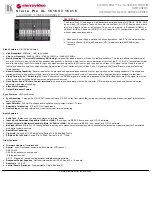
445
Step Command
Remarks
4.
Redistribute the VPN
routes.
import-route
protocol
[
process-id
|
all-processes
|
allow-ibgp
] [
cost
cost
|
route-policy
route-policy-name
|
tag
tag
] *
By default, no routes are
redistributed into RIP.
5.
(Optional.) Configure
the default cost for
redistributed routes.
default cost
value
The default cost is 0.
Configuring OSPF between an MCE and a PE
Step Command
Remarks
1.
Enter system view.
system-view
N/A
2.
Create an OSPF process for a
VPN instance and enter OSPF
view.
ospf
[
process-id
|
router-id
router-id
|
vpn-instance
vpn-instance-name
] *
N/A
3.
Disable routing loop
detection.
vpn-instance-capability simple
By default, routing loop detection
is enabled.
You must disable routing loop
detection for an OSPF VRF process
on the MCE. Otherwise, the MCE
does not receive OSPF routes from
the PE.
4.
(Optional.) Configure the
OSPF domain ID.
domain-id
domain-id
[
secondary
]
The default domain ID is 0.
5.
(Optional.) Configure the type
codes of OSPF extended
community attributes.
ext-community-type
{
domain-id
type-code1
|
router-id
type-code2
|
route-type
type-code3
}
The defaults are as follows:
•
0x0005 for Domain ID.
•
0x0107 for Router ID.
•
0x0306 for Route Type.
6.
(Optional.) Configure the
external route tag for
imported VPN routes.
route-tag
tag-value
By default, no route tag is
configured.
In some networks, a VPN might be
connected to multiple MCEs.
When one MCE advertises the
routes learned from BGP to the
VPN, the other MCEs might learn
the routes, resulting in routing
loops. To avoid such routing loops,
you can configure route tags for
VPN instances on an MCE. HP
recommends that you configure the
same route tag for the same VPN
on the MCEs.
7.
Redistribute the VPN routes.
import-route
protocol
[
process-id
|
all-processes
|
allow-ibgp
] [
cost
cost
|
nssa-only
|
route-policy
route-policy-name
|
tag
tag
|
type
type
] *
By default, no routes are
redistributed into OSPF.
















































